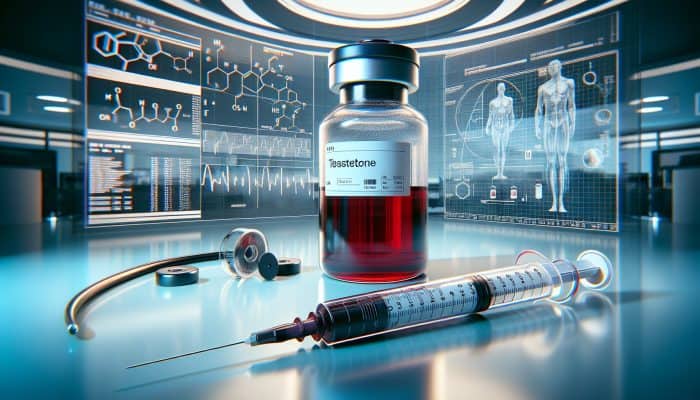Unlocking the Secrets of Testosterone Blood Testing: A Detailed Exploration
Understanding the Critical Reasons for Testosterone Blood Testing

The testosterone blood test is a vital diagnostic tool designed to assess testosterone levels, a crucial hormone that plays a significant role in various bodily functions circulating within your bloodstream. This test is essential for identifying a diverse range of health concerns, including <a href=”https://limitsofstrategy.com/hormonal-imbalance-fixes-effective-universal-strategies/”>hormonal imbalances</a>, infertility challenges, and several metabolic disorders that can disrupt your body’s natural balance. The testing process is straightforward and can be performed at numerous healthcare facilities, ensuring individuals eager to understand their hormonal health have convenient access to this critical information.
Testosterone is integral to numerous physiological functions, including muscle development, emotional well-being, and sexual drive. By participating in a testosterone blood test, individuals can determine if their hormone levels are within the healthy range suitable for their age and gender. The procedure is minimally invasive, and patients can typically expect results that may lead to significant changes in their health management plans moving forward.
 How to Effectively Undergo a Testosterone Blood Test
How to Effectively Undergo a Testosterone Blood Test
The <a href="https://ad4sc.com/testosterone-blood-test-guide-for-residents-of-buxton/">testosterone blood test</a> involves collecting a small blood sample, typically obtained from a vein in your arm. This procedure is performed by a trained healthcare professional, who will first clean the skin with an antiseptic wipe, apply a tourniquet to make the veins more visible, and then insert a needle to extract the blood. The entire process is generally swift, taking just a few minutes. While some individuals may feel a slight pinch or minor discomfort, most find the experience manageable and not overly painful.
Once the blood sample is taken, it is sent to a laboratory for comprehensive analysis. The resulting information will provide crucial insights into your testosterone levels, which will be interpreted alongside your overall health context. It’s important to note that the timing of the test can influence the outcomes, as testosterone levels vary throughout the day. Most healthcare professionals recommend scheduling the test in the morning, when testosterone levels are at their highest.
Essential Preparations Needed Before Your Testosterone Blood Test
Preparing for a testosterone blood test may differ based on individual health conditions and specific instructions from your healthcare provider. In certain instances, fasting for several hours before the test may be recommended. In other cases, it may be necessary to avoid certain medications that could affect hormone levels. Your healthcare provider will give you customized instructions tailored to your medical history, ensuring that the test yields the most accurate results possible.
If you are currently taking any medications, it is vital to inform your healthcare provider in advance, as adjustments to your treatment plan or the timing of the test may be required. Additionally, factors such as recent illnesses, increased stress levels, or significant lifestyle changes can also impact testosterone levels and should be discussed during your pre-test consultation. Being thoroughly prepared can lead to a smoother testing experience while improving the accuracy and utility of your results.
Exploring the Profound Benefits of Testosterone Testing

Identifying the Key Advantages of Regular Testosterone Testing
Regular monitoring of testosterone levels offers numerous benefits, particularly for individuals experiencing symptoms that could indicate hormonal imbalances or those at higher risk for conditions related to testosterone deficiency or excess. For example, tracking testosterone levels is crucial for managing <a href="https://bloodtest.co.uk/testosterone-blood-test-in-windlesham-essential-guide/">hypogonadism</a>, a condition characterized by inadequate testosterone production that can present with symptoms such as fatigue, mood swings, and diminished sexual desire.
Moreover, ongoing testing helps healthcare providers develop personalized treatment plans, allowing them to tailor interventions based on specific hormonal levels. This proactive strategy is essential in preventing complications resulting from untreated hormonal imbalances, such as osteoporosis and cardiovascular diseases. By gaining a thorough understanding of your testosterone levels, you can embark on a more informed health journey, making necessary adjustments based on your unique results and overall health condition.
How Awareness of Your Testosterone Levels Can Transform Your Health Outcomes
Gaining insight into your testosterone levels goes beyond simply acquiring numerical data; it can significantly influence your entire health strategy. Information obtained from a testosterone blood test can motivate you to adopt lifestyle changes aimed at improving your well-being. For instance, if low testosterone levels are identified, your healthcare provider may recommend dietary modifications or exercise routines designed to naturally enhance hormone levels, such as integrating strength training into your fitness regimen or adjusting your nutritional intake.
Furthermore, being aware of your testosterone levels opens doors for timely medical interventions when needed. If the results reveal a deficiency, treatment options such as testosterone replacement therapy may be considered, potentially leading to improvements in energy, mood, and sexual health. The broad implications of this knowledge can encourage a proactive approach to health management, reinforcing the relationship between awareness and overall wellness.
Improving Your Quality of Life Through Effective Testosterone Management

Consistent monitoring of testosterone levels can greatly enhance the quality of life for many individuals. Considering that testosterone is closely linked to energy levels, emotional stability, and sexual health, maintaining optimal levels often leads to substantial improvements in daily living. Individuals who successfully keep their testosterone levels within ideal ranges frequently report heightened energy, better emotional regulation, and a more satisfying intimate life.
In addition to immediate benefits, understanding and managing testosterone levels can contribute to long-term health success. As individuals age, testosterone levels naturally decline, which can lead to various health challenges. By regularly monitoring these levels, you can proactively address potential issues, ensuring a more vigorous and fulfilling life as you progress through the years. Ultimately, routine testosterone testing is not just a diagnostic tool; it represents a crucial component of comprehensive health management that can significantly enhance your quality of life.
Insights from Experts on Testosterone Blood Testing in Filton
What Frequencies Do Experts Recommend for Testosterone Testing?
Experts provide various recommendations regarding the frequency of testosterone testing, tailored to individual factors such as age, symptoms, and medical history. For many men, it is advisable to check testosterone levels every one to two years, especially if they exhibit symptoms indicative of low testosterone or are at risk for specific medical conditions. Conversely, older adults or those diagnosed with hormonal disorders may require more frequent monitoring to maintain stable health.
Here’s a summary of the recommended testing frequencies for different demographics:
- Men aged 30-40: Every 3-5 years
- Men aged 41-60: Every 1-2 years
- Men over 60: Annually or as advised by a healthcare provider
- Individuals displaying symptoms of low testosterone: At the onset of symptoms and as directed by a physician
- Patients undergoing treatment for hormonal imbalances: As instructed by their healthcare provider
These recommendations underscore the importance of personalized medical guidance. Always consult with a healthcare professional to create a testing schedule that aligns with your specific health needs.
How to Accurately Interpret Your Testosterone Test Results
Interpreting the results of a testosterone blood test requires a solid understanding of normal ranges, which can vary significantly based on age and gender. Generally, for adult males, standard testosterone levels are expected to fall between 300 and 1,000 ng/dL, while for females, this range is considerably lower, approximately 15 to 70 ng/dL. However, these expected ranges may differ between laboratories, making it crucial to review your results with a healthcare professional for accurate interpretation.
Healthcare providers typically use specific benchmarks to understand the implications of your results. For example, if a male patient presents with testosterone levels at the lower end of the spectrum, this may prompt further evaluations to determine whether it correlates with clinical symptoms such as fatigue or reduced libido. Conversely, elevated testosterone levels may indicate underlying conditions like tumors or adrenal gland disorders, necessitating further testing and potentially more comprehensive treatment strategies. Real-world cases illustrate how nuanced interpretations can effectively guide patient care, facilitating timely interventions that support long-term health.
What Are the Latest Developments in Testosterone Research?
Recent studies have highlighted the complex relationship between testosterone levels and various health outcomes. A significant focus has been on the link between low testosterone and an increased risk of conditions such as metabolic syndrome, cardiovascular diseases, and osteoporosis. Current findings suggest that maintaining optimal testosterone levels can enhance not only physical health but also mental well-being by reducing the risk of depression and anxiety disorders.
Additionally, research has explored the effects of testosterone replacement therapy (TRT) on individuals with confirmed deficiencies. Evidence indicates that TRT can lead to substantial improvements in energy, mood, and sexual function, underscoring the potential for a more proactive approach to managing low testosterone. Ongoing research in this area continues to evolve, offering new insights into treatment and prevention strategies for testosterone-related health concerns, emphasizing the essential role of regular testing as a means of identifying and addressing hormonal imbalances early on.
Finding Testosterone Testing Services in Filton
Trusted Medical Facilities Offering Testosterone Testing
Filton is home to several reputable medical facilities that provide testosterone blood testing services. Choosing a facility known for its quality and professionalism is critical to obtaining accurate and reliable results. Some highly-rated medical establishments in Filton where you can arrange your testing include:
- Filton Health Centre
- Southmead Hospital
- North Bristol NHS Trust
- The Longcross Clinic
- Glenfrome Medical Practice
- BrisDoc Healthcare Services
These facilities offer a comprehensive range of services, including initial consultations, blood tests, and follow-up care, ensuring a holistic approach to your hormonal health. It is advisable to review patient feedback and ratings to ensure you select a facility that adequately meets your needs.
Steps to Successfully Schedule Your Testosterone Testing Appointment
Scheduling an appointment for a testosterone blood test in Filton is a straightforward process. Many medical facilities offer the convenience of online appointment scheduling through their websites, making access easy. Alternatively, patients can also book appointments by directly calling the facility. When organizing your appointment, be prepared to provide personal information, including your name, contact details, and any relevant medical history or symptoms you may be experiencing.
Additionally, it is wise to inquire about any specific preparations that may be necessary before the test, such as fasting or adjustments to medications, to ensure optimal accuracy in results. By taking the time to organize your appointment properly, you lay the groundwork for a successful testing experience, enabling informed health decisions based on your results.
What to Expect During Your Testosterone Testing Visit
When visiting a clinic in Filton for your testosterone blood test, you can expect to receive professional and efficient service. Upon arrival, you will likely check in at the reception, where staff may ask for identification and relevant medical information. After a brief waiting period, you will be escorted to a private area where the blood draw will take place.
The healthcare professional conducting the test will thoroughly explain the procedure, ensuring your comfort throughout the process. You can anticipate the blood draw to be quick, usually completed within just a few minutes. After the sample is collected, you may need to wait briefly for post-draw instructions, which might include hydration recommendations and an estimate of when to expect your results. Overall, the experience is designed to be seamless and uncomplicated, prioritizing patient care and comfort.
Understanding the Costs and Insurance Coverage for Testosterone Tests
Gaining insight into the costs associated with testosterone tests in Filton is essential for effective health management planning. The price for a testosterone blood test can vary depending on the facility and whether additional tests are included. On average, costs may range from £50 to £150. Patients are encouraged to consult directly with the facility for specific pricing information and any potential additional costs related to consultations or follow-up visits.
Insurance coverage for testosterone testing may also differ. In some cases, the NHS may cover the costs if the test is deemed medically necessary, particularly for individuals exhibiting symptoms suggestive of low testosterone or related health issues. It is advisable to check with your General Practitioner (GP) or insurance provider for specific coverage details before scheduling your appointment, ensuring you are fully aware of any potential financial implications.
Essential Preparations for Your Testosterone Blood Test
Key Steps to Take Before Undergoing the Test
Preparing for your testosterone blood test is crucial to ensuring that the results are accurate and meaningful. A common recommendation is to fast for a certain period prior to the test, typically overnight. This helps eliminate variables that could distort testosterone levels, providing a clearer depiction of your hormonal status. Furthermore, your healthcare provider may advise against certain medications or supplements in the days leading up to the test, especially those known to influence hormone production.
It is vital to adhere strictly to any specific instructions given by your healthcare provider. If you have concerns or questions about preparation, do not hesitate to reach out for clarification. Proper preparation can significantly affect the accuracy of test results, facilitating the development of more effective health management strategies.
What Essential Items Should You Bring to Your Appointment?
When attending your appointment for a testosterone blood test, it is essential to bring several key items to facilitate the process. Firstly, ensure you have valid identification, such as a driver’s license or passport, as this may be necessary for check-in at the clinic. Additionally, bringing any relevant medical records, including previous test results or documentation related to your medical history that could be pertinent to the test, is advisable.
It is also beneficial to compile a list of any medications you are currently taking, including prescription medications, over-the-counter drugs, and any supplements. This information can assist your healthcare provider in assessing potential influences on your testosterone levels, leading to a more comprehensive understanding of your overall health status.
Effective Strategies to Manage Anxiety Before Your Test
Feeling anxious about undergoing a testosterone blood test is entirely normal; however, there are several effective strategies to help manage this anxiety. One useful technique is practicing relaxation methods, such as deep breathing or meditation, which can calm your mind and reduce stress levels. Taking a few moments to focus on your breath before the test can create a sense of peace, enabling you to feel more centered.
Additionally, educating yourself about the testing process can empower you. Understanding what will happen during the blood draw can alleviate uncertainty and help you approach the test with greater confidence. If anxiety persists, consider bringing a friend or family member for support; their presence can provide comfort and reassurance during your visit. Remember, effectively addressing anxiety is an important facet of your overall health journey.
Decoding and Understanding Your Test Results
What Do Normal Testosterone Levels Reveal About Your Health?
Normal testosterone levels can vary significantly based on factors such as age and gender, making it essential to interpret results within context. For adult males, typical testosterone levels generally range from 300 to 1,000 ng/dL, whereas for females, levels are usually much lower, around 15 to 70 ng/dL. These levels can fluctuate throughout the day, with levels typically peaking in the morning hours.
Upon receiving your test results, your healthcare provider will clarify what your specific numbers indicate regarding your health. They may compare your results to established normal ranges and discuss the implications of any deviations. Understanding the context of your testosterone levels is crucial for developing a comprehensive health strategy, guiding any necessary interventions or lifestyle adjustments moving forward.
Steps to Take If Your Testosterone Levels Are Low
If your testosterone levels are found to be low, this may signify various health issues that could warrant further evaluation. Low testosterone levels, also known as hypogonadism, can present symptoms such as fatigue, decreased libido, mood disturbances, and loss of muscle mass. Your healthcare provider will likely recommend additional tests or evaluations to determine the underlying cause of the deficiency.
Treatment options may include testosterone replacement therapy (TRT), which can significantly alleviate symptoms and improve overall quality of life. However, it’s essential to discuss the associated risks and benefits of TRT with your healthcare provider, as this treatment may not be suitable for everyone. Additionally, lifestyle improvements—such as enhancing diet, increasing physical activity, and effectively managing stress—can play a vital role in successfully managing low testosterone levels.
What Actions to Take If Your Testosterone Levels Are Elevated?
High testosterone levels can also raise concerns and may require further investigation. Elevated testosterone levels can result from various factors, including testosterone replacement therapy, certain medical conditions, or the use of anabolic steroids. Symptoms associated with high testosterone may include increased aggression, acne, and mood swings.
If your results indicate elevated testosterone levels, your healthcare provider will work with you to identify the underlying cause and may recommend further testing to rule out any serious conditions. Treatment may involve adjusting medication dosages, implementing lifestyle changes, or, in some cases, more intensive medical interventions. Staying informed and actively engaging in discussions about elevated testosterone levels with your healthcare provider is crucial for effectively managing this aspect of your health.
Strategies for Effectively Monitoring Your Testosterone Levels
Regularly monitoring testosterone levels is essential for tracking changes over time and maintaining optimal hormonal health. Your healthcare provider can advise on the appropriate frequency for follow-up tests, which may depend on your initial results and any ongoing health issues. Generally, individuals receiving treatment for low testosterone should have their levels checked periodically to evaluate the efficacy of the intervention.
Moreover, maintaining a personal health journal can be advantageous, allowing you to document any changes in symptoms, lifestyle factors, or overall well-being. This information can provide valuable insights for both you and your healthcare provider, enabling more informed decisions regarding your treatment plan. Proactive health management is fundamental to sustaining optimal testosterone levels and overall wellness.
How Lifestyle Choices Impact Testosterone Levels
Numerous lifestyle factors can significantly influence testosterone levels, making it vital to consider these elements when managing your hormonal health. Diet plays a crucial role; consuming a balanced diet rich in essential nutrients, particularly healthy fats, proteins, and vitamins, can support optimal hormone production. Foods such as lean meats, fish, nuts, and leafy greens are especially beneficial in promoting healthy testosterone levels.
Exercise is another critical factor, with regular strength training proving particularly effective in boosting testosterone levels. Maintaining a healthy weight and engaging in consistent physical activity can help counteract hormonal imbalances. Additionally, ensuring adequate sleep and effectively managing stress through relaxation techniques can also positively influence testosterone regulation.
Recognizing these lifestyle factors empowers individuals to make informed choices that foster their hormonal health. By adopting healthier habits, you can create a more conducive environment for sustaining optimal testosterone levels, ultimately enhancing your overall quality of life.
Research-Backed Insights on Testosterone Blood Testing in Filton
How Regular Testing Has Improved Patient Health Outcomes
Research indicates that consistent testosterone testing can lead to more effective management of hormonal imbalances, ultimately enhancing patient outcomes. For individuals diagnosed with low testosterone, timely testing enables early intervention, facilitating the initiation of treatment plans customized to individual needs. This proactive strategy can prevent complications associated with untreated hormonal deficiencies, such as osteoporosis and increased cardiovascular risks.
Moreover, studies suggest that individuals who actively engage in their health management—through regular testing and follow-up consultations—are more likely to achieve favourable health outcomes. By gaining a deeper understanding of their hormonal status, patients can take actionable steps to enhance their overall well-being, embarking on a more informed and empowering health journey. Regular testing not only provides valuable insights but also establishes a foundation for ongoing health management and preventative care.
Long-Term Advantages of Consistent Monitoring
Long-term monitoring of testosterone levels offers numerous benefits that extend beyond immediate health concerns. By consistently tracking hormone levels, individuals can gain valuable insights into their overall health trajectory, making it easier to identify potential imbalances early. This proactive approach can greatly reduce the risk of developing serious health issues associated with hormonal imbalances, such as metabolic disorders and cardiovascular diseases.
Furthermore, being aware of testosterone levels can empower individuals to implement informed lifestyle changes that promote long-term health. For instance, if fluctuations in testosterone levels are detected, it may prompt modifications to diet or exercise routines, encouraging an overall healthier lifestyle. Over time, this commitment to regular monitoring and management can lead to enhanced quality of life, increased energy levels, and improved emotional health.
How Test Results Influence Treatment Strategies
Test results from a testosterone blood test are crucial in shaping treatment strategies for individuals experiencing hormonal imbalances. The insights gained can assist healthcare providers in determining the most appropriate interventions, whether that involves testosterone replacement therapy, lifestyle modifications, or a combination of both. Understanding the specific context of testosterone levels allows providers to tailor treatment strategies that are both effective and safe for each patient.
Moreover, as treatment progresses, ongoing testing enables adjustments based on evolving needs. Regular assessments of testosterone levels ensure that any treatment plan remains responsive to the individual’s changing health status, optimizing outcomes and minimizing potential side effects. This dynamic approach to health management underscores the significance of regular testing in guiding effective treatment pathways.
Enhancing Your Quality of Life Through Regular Testing
Engaging in regular testosterone testing can dramatically improve the quality of life for individuals, particularly those facing challenges related to hormonal imbalances. By maintaining optimal testosterone levels, individuals often experience enhancements in energy, mood, and overall wellness. Regular testing serves as a feedback mechanism, empowering individuals to better understand their hormonal health and make informed choices that support their lifestyle.
Consequently, those who proactively monitor their testosterone levels frequently enjoy increased vitality and a heightened sense of control over their health. This proactive approach fosters a deeper understanding of the interplay between lifestyle factors, hormonal health, and overall well-being. Encouraging individuals to take charge of their health through regular testosterone testing can ultimately lead to a more fulfilling and enriched quality of life.
Addressing Common Concerns and Frequently Asked Questions
How Painful Is the Experience of a Testosterone Blood Test?
The testosterone blood test involves a quick needle prick, which may cause minor discomfort but is generally not considered painful. Most individuals report only a fleeting sensation during the blood draw. If you have concerns about potential discomfort, consider discussing pain management options with your healthcare provider prior to testing.
Can Dietary Habits and Physical Activity Influence Test Results?
Yes, both diet and exercise can significantly impact testosterone levels. A balanced diet and regular physical activity can help maintain healthy hormone levels, whereas poor nutrition and a sedentary lifestyle may lead to imbalances. It is advisable to adopt a healthy lifestyle both before and after testing to optimize results.
Is the NHS Covering the Cost of Testosterone Tests?
In certain situations, the NHS may cover the expense of a testosterone blood test if it is deemed medically necessary. Coverage varies based on individual circumstances, so it is advisable to consult with your GP for specific details regarding insurance coverage and eligibility.
What Symptoms Indicate Low Testosterone Levels?
Symptoms of low testosterone may include fatigue, reduced libido, lack of motivation, mood changes, and loss of muscle mass. If you are experiencing these symptoms, a testosterone blood test may be warranted to evaluate your hormonal status and guide potential treatments.
How Long Will It Take to Receive Your Results?
Typically, results from a testosterone blood test can be expected within a few days to a week, depending on the laboratory’s processing time and turnaround. Your healthcare provider will inform you when you can anticipate receiving your results, ensuring you are kept updated throughout the process.
Can I Conduct the Test at Home?
Home testing kits for testosterone are available; however, their accuracy may vary widely. It is generally recommended to have a test performed at a professional medical facility to ensure reliable results and appropriate interpretation by a healthcare provider.
What Lifestyle Changes Can Help Raise Testosterone Levels?
To elevate testosterone levels, consider incorporating regular strength training exercises, maintaining a balanced diet rich in healthy fats and proteins, ensuring adequate sleep, and effectively managing stress. These lifestyle changes can positively influence hormone production and overall health.
Is There an Age When Testosterone Testing Is Suggested?
While there is no specific age for routine testosterone testing, men over 30 should consider testing every few years, particularly if they experience symptoms related to hormonal imbalances. Consulting with a healthcare provider can assist in determining the appropriate timing based on individual health conditions.
What Should You Do If You Miss Your Appointment?
If you miss your appointment for a testosterone blood test, it is advisable to contact the facility to reschedule as soon as possible. Missing an appointment can delay your access to crucial health information, so prompt action is essential.
Is It Necessary to Repeat the Test?
Repeating the testosterone blood test may be necessary if initial results indicate abnormal levels or if symptoms persist. Your healthcare provider will guide you on the need for retesting based on your health status and treatment progress, ensuring you receive optimal care.
Connect with us on Facebook!
This Article Was First Found On https://bloodtest.co.uk
The Article Testosterone Blood Test Guide for Filton Residents Was Found On https://limitsofstrategy.com
The Article Testosterone Blood Test Insights for Filton Locals First Appeared ON
: https://ad4sc.com










No responses yet